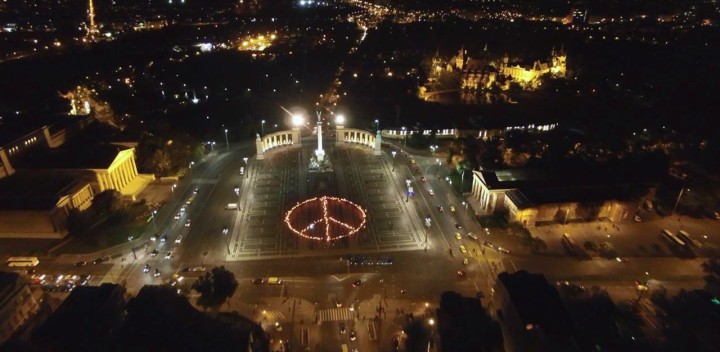500 people gathered in Budapest’s Heroes Square on Friday evening, 2nd of October, to mark the International Day of Nonviolence.
Organised by different communities of Silo’s Message in the city, mostly through a campaign on Facebook, people came together to form a symbol for ‘peace, nonviolence, compassion and reconciliation.’ The symbol of the UK Campaign for Nuclear Disarmament which has become synonymous with peace was chosen.
More than a protest, or a march, or something noisy, the organisers chose to do something more spiritual to “connect with ourselves and with each other, nurturing the kindness and strength necessary to learn how to resist the violence within us and around us.”
“We will be there for those who suffer from violence and also for those who better the world every day with their compassion and with their attitude of treating others the way they want to be treated,” the invitation continued.
Budapest has recently been the scene of terrible images beamed around the world on TV as refugees from Iraq, Afghanistan and Syria have poured into the European Union. Commenting on this the organisers said, “Violence needs to be resolved both in the war zones and in Europe that tries to turn its head away. We have to share the destiny of humanity, our purpose is to humanise the world: to recognise that the kind of development that serves only a few is in fact a development for nobody.”
Fear pervades the discussions both at an inter-governmental level when dealing with the refugee crisis and at the level of discussions among friends and at the work place. The organisers called on those participating in the event to, “Rebel against fear and discrimination that turns you against your brother! Rebel against fundamentalism, against the religious intolerance that forces millions of people to flee from it! Rebel against the presentable European violence, against hypocrisy and closing the borders for those who suffer! Rebel against the cynical leaders and the business interests lying behind the wars! Rebel before they make you believe that there exists “we” and “them”, offering you false solutions in the name of “security”.”










